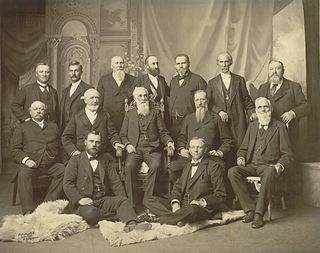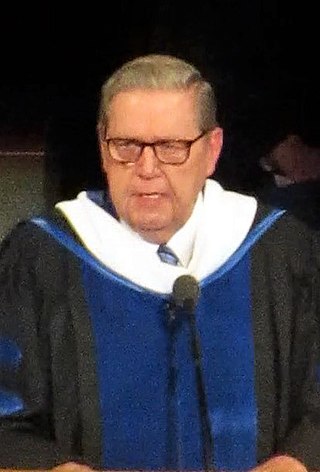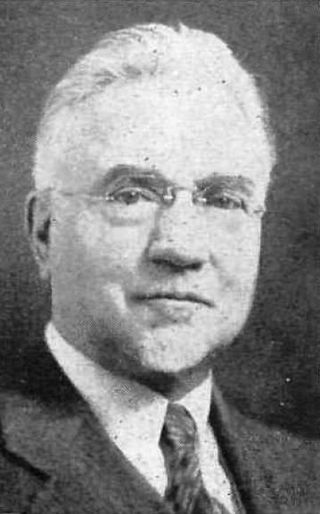
Brigham Young was an American religious leader and politician. He was the second president of the Church of Jesus Christ of Latter-day Saints from 1847 until his death in 1877. During his time as church president, Young led his followers, the Mormon pioneers, west from Nauvoo, Illinois, to the Salt Lake Valley. He founded Salt Lake City and served as the first governor of the Utah Territory. Young also worked to establish the learning institutions that would later become the University of Utah and Brigham Young University. A polygamist, Young had at least 56 wives and 57 children. He formalized the prohibition of black men attaining priesthood, and led the church in the Utah War against the United States.
In Mormonism, the restoration refers to a return of the authentic priesthood power, spiritual gifts, ordinances, living prophets and revelation of the primitive Church of Christ after a long period of apostasy. While in some contexts the term may also refer to the early history of Mormonism, in other contexts the term is used in a way to include the time that has elapsed from the church's earliest beginnings until the present day. Especially in the Church of Jesus Christ of Latter-day Saints "the restoration" is often used also as a term to encompass the corpus of religious messages from its general leaders down to the present.

In the Church of Jesus Christ of Latter-day Saints, the Quorum of the Twelve Apostles is one of the governing bodies in the church hierarchy. Members of the Quorum of the Twelve Apostles are apostles, with the calling to be prophets, seers, and revelators, evangelical ambassadors, and special witnesses of Jesus Christ.

Jeffrey Roy Holland is an American educator and religious leader. He served as the ninth president of Brigham Young University (BYU) and is the acting president of the Quorum of the Twelve Apostles of the Church of Jesus Christ of Latter-day Saints. As a member of the Quorum of the Twelve, Holland is accepted by the church as a prophet, seer, and revelator. Currently, he is the third most senior apostle in the church.

Charles William Penrose was a member of the Quorum of the Twelve Apostles of the Church of Jesus Christ of Latter-day Saints from 1904 to 1911. Penrose was also a member of the First Presidency, serving as a counselor to church presidents Joseph F. Smith and Heber J. Grant from 1911 until his death.

Richard Roswell Lyman was an American engineer and religious leader who was an apostle in the Church of Jesus Christ of Latter-day Saints from 1918 to 1943.

John Andreas Widtsoe was a Norwegian-American scientist, author, and religious leader who was a member of the Quorum of the Twelve Apostles of the Church of Jesus Christ of Latter-day Saints from 1921 until his death in 1952.

Mormon cinema usually refers to films with themes relevant to members of the Church of Jesus Christ of Latter-day Saints. The term has also been used to refer to films that do not necessarily reflect Mormon themes but have been made by Mormon filmmakers. Films within the realm of Mormon cinema may be distinguished from institutional films produced by the LDS Church, such as Legacy and Testaments, which are made for instructional or proselyting purposes and are non-commercial. Mormon cinema is produced mainly for the purposes of entertainment and potential financial success.
Merrill Boyd Jenson is an American composer and arranger who has composed film scores for over thirty films including Emma Smith: My Story, Joseph Smith: Prophet of the Restoration, The Testaments of One Fold and One Shepherd, Legacy, Harry's War, and Windwalker. Many of the films Jenson composed music for were directed by Academy Award-winning director Kieth Merrill. Jenson has also composed several concert productions including a symphony that premiered at Carnegie Hall. Additionally, he has composed music for many television commercials including the acclaimed Homefront ads, music for three outdoor pageants, and several albums. Jenson lives in Provo, Utah with his wife Betsy Lee Jenson.
Harold David Burton was the thirteenth Presiding Bishop of the Church of Jesus Christ of Latter-day Saints from 1995 to 2012 and has been the chairman of the University of Utah board of trustees since 2016.
Sidney Branton Sperry was one of three scholars who were members of the Church of Jesus Christ of Latter-day Saints who began the scholarly and systematic study of the Book of Mormon in the mid-20th century — the other two being John L. Sorenson and Hugh W. Nibley. Sperry was also a leading Latter-day Saint scholar of the Bible.
George Wendell Pace was an American professor of religion at Brigham Young University (BYU) in Provo, Utah. He was a popular writer and speaker on religion in The Church of Jesus Christ of Latter-day Saints and part of a public criticism voiced by Apostle Bruce R. McConkie in 1982.
Dean Cornell Jessee is a historian of the early Latter Day Saint movement and leading expert on the writings of Joseph Smith Jr.
Arnold Kent Garr was the chair of the department of Church History and Doctrine at Brigham Young University (BYU) from 2006 to 2009. He was also the lead editor of the Encyclopedia of Latter-day Saint History.
Richard Eyring "Rick" Turley Jr. is an American historian and genealogist. He previously served as both an Assistant Church Historian of the Church of Jesus Christ of Latter-day Saints and as managing director of the church's public affairs department.

Thomas C. Christensen is an American cinematographer, film director, and writer best known for his work on films related to the history of the Church of Jesus Christ of Latter-day Saints, including Joseph Smith: The Prophet of the Restoration, Gordon B. Hinckley: A Giant Among Men, 17 Miracles, and Ephraim's Rescue. He has made films about the Martin and Willie handcart companies who traversed the plains toward the Salt Lake Valley in late 1856. Christensen is also a member of the American Society of Cinematographers.
Alan Gerald Cherry is an African American who in the 1960s joined the Church of Jesus Christ of Latter-day Saints against opposition. He was inspired by the American civil rights movement.
Stephen Brown Allen is a maker of Latter-day Saint religious and proselytizing films.
This is a bibliography of works on the Latter Day Saint movement.







